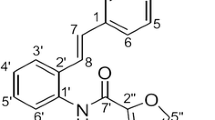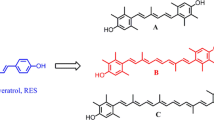Abstract
Resveratrol, a trihydroxystilbene found in grapes and several plants, has been shown to be active in inhibiting multistage carcinogenic process. Using resveratrol as the prototype, we synthesized several analogs and evaluated their growth inhibitory effect using cultured human cancer cells. In the present report we show that one of the resveratrol analogs, 3, 5,2’,4’-tetramethoxy-trans-stilbene, potentiated the inhibition of cancer cell growth. Prompted by the strong growth inhibitory activity of the compound (IC50; 0.8 μg/ml) compared to resveratrol (IC50; 18.7 μg/ml) in cultured human colon cancer cells (Col2), we performed an action mechanism study using the compound. The compound induced the accumulation of cellular DNA contents in the sub-G0 phase DNA contents of the cell cycle by in a timedependent manner. The morphological changes were also consistent with an apoptotic process. This result indicated that the compound induced apoptosis of cancer cells, and may be a candidate for use in the development of potential cancer chemotherapeutic or cancer chemopreventive agents.
Similar content being viewed by others
References
Ali, M. A., Kondo, K., Tsuda, Y., Studies on crude drugs effective on visceral larva migrans. XV. Synthesis and nematocidal activity of hydroxystilbenes.Chem. Pharm. Bull., 40, 1130–1136 (1992).
Carbo, N., Costelli, P., Baccino, F. M., Lopez-Soriano, F. J., and Argiles, J. M., Resveratrol, a natural product present in wine, decreases tumour growth in a rat tumour model.Biochem. Biophys. Res. Commun., 254, 739–743 (1999).
Elattar, T. M. and Virji, A. S., The effect of red wine and its components on growth and proliferation of human oral squamous carcinoma cells.Anticancer Res., 19, 5407–5414 (1999).
Frankel, E. N., Waterhouse, A. C., and Kinsella, J. E., Inhibition of human LDL oxidation by resveratrol.Lancet, 341, 1103–1104, (1993).
Hong, W. K. and Sporn, M. B., Recent advances in chemoprevention of cancer.Science, 278, 1073–1077 (1997).
Hsieh, T. C. and Wu, J. M., Differential effects on growth, cell cycle arrest and induction of apoptosis by resveratrol in human prostate cancer cell lines.Exp. Cell Res., 249, 109–115 (1999).
Jang, M., Cai, L., Udeani, G. O., Slowing, K. V., Thomas, C. F., Beecher, C. W. W., Fong, H. S. S., Farnsworth, N. R., Kinghom, A. D., Mehta, R. C., Moon, R. C., and Pezzuto, J. M., Cancer chemopreventive activity of resveratrol, a natural product derived from grapes.Science, 275, 218–220 (1997).
Kelloff, C. J., Boone, C. W., Malone, W. F., and Steele, V.E., Recent results in preclinical and clinical drug development of chemopreventive agents at the National Cancer Institute. In: L. Wattenberg, M. Lipkin, C.W. Boone, and G.J. Kelloff (eds.), Cancer chemoprevention, pp. 41–56, Boca Raton, FL: CRC Press, (1992).
Lee, S. K., Cui, B., Mehta, R. R., Kinghom, A. D., and Pezzuto, J.M., Cytostatic mechanism and antitumor potential of novel 1 H-cyclopenta[b]benzofuran lignans isolated fromAglaia elliptica.Chemico-Biol. Interact, 115, 215–228 (1998).
Lu, J., Ho, C. -T., Ghai, G., and Chen, K. Y., Resveratrol analog, 3,4,5,4-tetrahydroxystilbene, differentially induces pro-apoptotic p53/Bax gene expression and inhibits the growth of transformed cells but not their normal counterparts.Carcinogenesis, 22, 321–328 (2001).
Lu, R. and Serrero, G. J., Resveratrol, a natural product derived from grape, exhibits antiestrogenic activity and inhibits the growth of human breast cancer cells.J. Cell Physiol., 179, 297–304 (1999).
Nam, K. A., Kim, S., Jung, S., and Lee, S. K., Cytotoxic potential of stilbene analogs and induction of apoptosis in cultured human cancer cells.Proc. 2000 Kor. Soc. Applied Pharmacol., 92 (2000).
Pace-Asciak, C. R., Hahn, S. E., Diamandis, E. P., Soleas, G., and Goldberg, D. M., The red wine phenolics trans-resveratrol and quercetin block human platelet aggregation and eicosanoid synthesis: implications for protection against coronary heart disease.Clin. Chim. Acta., 235, 207–219 (1995).
Park, J. -W., Choi, Y. -J., Jang, M. -A., Lee, Y. -S., Jun, D. Y., Suh, S.-I., Baek, W. -K., Suh, M. -H., Jin, I. -N., and Kwon, T. K., Chemopreventive agent resveratrol, a natural product derived from grapes, reversibly inhibits progression through S and G2 phases of the cell cycle in U937 cells.Cancer Lett., 163, 43–49 (2001).
Schneider, Y., Vincent, F., Duranton, B., Badolo, L., Gosse, F., Bergmann, C., Seiler, N., and Raul, F., Antiproliferative effect of resveratrol, a natural component of grapes and wine, on human colonic cancer cells.Cancer Lett., 158, 85–91 (2000).
Sporn, M. B. and Newton, D. L., Chemoprevention of cancer with retinoids.Fed. Proc., 38, 2528–2534 (1979).
Surh, Y. -J., Hurh, Y. -J., Kang, J. -Y., Lee, E., Kong, G., and Lee, S. J., Resveratrol, an antioxidant present in red wine, induces apoptosis in human promyelocytic leukemia (HL-60) cells.Cancer Lett., 140, 1–10 (1999).
Uenobe, F., Nakamura, S., and Miyazawa, M., Antimutagenic effect of resveratrol against Trp-P-1.Mutat. Res., 373, 197–200 (1997).
Wattenberg, L. W., An overview of chemoprevention: current status and future prospects.Proc. Soc. Exp. Biol. Med., 216, 133–141 (1997).
Author information
Authors and Affiliations
Corresponding author
Rights and permissions
About this article
Cite this article
Nam, K.A., Kim, S., Heo, Y.H. et al. Resveratrol analog, 3,5,2′,4′-tetramethoxy-trans-stilbene, potentiates the inhibition of cell growth and induces apoptosis in human cancer cells. Arch Pharm Res 24, 441–445 (2001). https://doi.org/10.1007/BF02975192
Received:
Issue Date:
DOI: https://doi.org/10.1007/BF02975192




